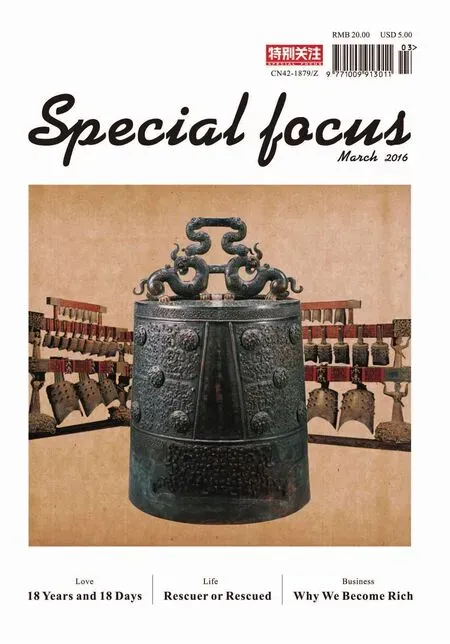The Body Is to Serve You
By Cai Chongda
The Body Is to Serve You
By Cai Chongda

T hisisataleaboutthe great-grandmotheronmy mother's side“Ah Tai”,who lived to the ripe-old age of 99.It was as if she had the fountain of youth bubbling up from her own backyard.
Ah Tai’s daughter,my grandmother, left us suddenly while she was only in her 50s.The relatives were afraid that her heart-broken mother would become disparate and accompany her daughter to the other side.
It seemed,however,that a strange fit of anger,not grief,filled Ah Tai’s heart. She just kept moving around,first opening the coffin lid to have a final look, then moving away to the kitchen to examine the funeral offerings.
I was a first-grader at that time.As I recall,Ah Tai did not weep at all duringthe funeral,even when the cremation firesdancedaroundherdaughter's corpse devouring it in a spit of blue flame.She watched the scene calmly through her squinted eyes,as if she was just sleepy,not emotional.
I was confused and asked her,“Ah Tai,why aren’t you sad?”To my surprise,her wrinkled face,full of the lines of senility,unfolded in a wry little smile. Her reply in my ear was,“Because I’m willing to move on.”
I have heard that phrase countless times because Ah Tai came to my house frequentlyaftermygrandmother’s death.She said her daughter told her that,due to the fact that my parents were busy and my grandparents had passed away,it would be her duty to help take care of me.
She was tough and always put forth a great lot of effort.When she cut vegetables,she swung the blade forcefully,as if she was chopping ribs.Once when she was preparing dinner I heard her voice ring out resoundingly yet calmly from the kitchen,“Ouch!”
“What happened?”I shouted.
“Nothing.I just cut off a finger.”
The whole family scurried into the kitchen to see a bloody scene accompanied by her unfazed expression,as if she had only pared off a bit of skin.
My mother told me more about Ah Tai.It was said that once when her son was just a toddler,she threw him into the sea to make him“teach himself how to swim”.My granduncle came within an inch of his life that day.Her neighbors reproached her,but she just said coldly,“The body is there to serve you, not the other way around.”
I asked Ah Tai if the story was true. She said,“True.You are a fool if you are always a slave to your body.Only those who know how to use it can make something out of themselves.”
It seemed like just the random balderdash of a old dotty.
Anyway,I felt Ah Tai was like a stone—too hard to be hurt.She was actually famous in our small town for being exceptionally hardy.When she was 90,she could still walk on her bound feet[1],from her village to my home in the town.
When Ah Tai was 92,however,I did see her cry once.One day she was climbing on her roof to mend a hole, and fell through it.Later when I went to visit her,she recognized the sound of my footsteps from a distance,crying out inawhimper,“Ohmygood great-grandson,Ah Tai is in a bind.She can’t move.”
Sobbing,she asked me to visit hermore often.From then on,she had to sit on a chair all day waiting for me.I did visit her often,especially when I got into trouble,because I found comfort and consolation in her company.
This habit continued even when I grew up,went to the university,and then worked in a city far away.Whenever I was frustrated,I would ask for time off and returned to Ah Tai.She probablycouldnotunderstandmy grievances,but when I saw her smile unfolding through the aged layers of wrinkles,my spirit would be soothed to some extent.
It was just another morning when my mother called me to say,“Ah Tai’s gone.”O(jiān)ur cries resounded through the still,damp morning air.
My mother said that Ah Tai’s last words were for me.“My little puppy, dare you cry!Death is nothing.When you long for me,I will come to you.It's much more convenient without a body.”
Not until that moment did I understand her view of life:The less you think of your body and its desires,the swifter and happier the days of your life will pass.
Note:[1]In Imperial China,foot binding(also known as“l(fā)otus feet”)was the custom of applying painfully tight binding to the feet of young girls to prevent further growth.This custom of old times was announced to be illegal in the early 20th century.
(FromNo More Than Skin,Tianjin Renmin Press.Translation:Wang Xiaoke.Illustration:Liang Baigeng.)


